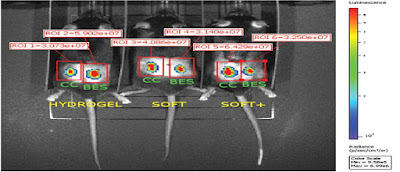Hydrogel Solutions for Tissue Reconstruction and Repair
Alphabioregen/Neuromics are pleased to announce the use of our Hydrogels for reconstructing living biomaterials for regenerative biology and medicine: Suwan N. Jayasinghe,Jensen Auguste, Chris J. Scotton. Platform Technologies for Directly Reconstructing 3D Living Biomaterials. DOI: 10.1002/adma.201503001.
In this study, researchers use our Collagen Hydrogel, Collagen Hydrogel Soft and Collagen Hydrogel Soft+ to describe in vivo applications using a murine model to interrogate biocompatibility and cellular behavior post-transfer.
Luc macrophages (CC or BES) were then incorporated into a fl uid mixture containing one of three alternative collagen-based hydrogels, namely, Collagen Hydrogel, Collagen Hydrogel Soft, or Collagen Hydrogel Soft+ (resulting in six possible combinations of macrophages and biopolymer).
Overview of Results
Figure: Bioluminescent imaging of implanted macrophage–biopolymer mixes. IC-21-Luc macrophages (CC or BES) were mixed with biopolymer (Hydrogel, Soft, or Soft+) and subcutaneously injected into the dorsal fl anks of C57Bl/6 mice (three mice per hydrogel, with CC on the left fl ank and BES on the right). Following intraperitoneal injection of delta-luciferin, macrophage bioluminescence was detected using an IVIS Lumina II imaging system. A representative image from day 1 post-implantation (and 25 min post luciferin injection) is shown, indicating the peak detectable radiance (photons s −1 cm −2) in identically sized regions of interest. The CE results were very similar to the BES implants.
Figure: Histological analysis of the macrophage–biopolymer implantation site (MSB staining). At day 4 post-implantation, skin was harvested from each dorsal fl ank, and processed for histology. Where possible, serial sections directly adjacent to those shown in Figure 4 were stained with a modifi ed trichrome stain. Mature fi brillar collagen within the dermis appeared dark blue, while the collagen within the hydrogel was generally lighter blue in appearance, indicating a less highly cross-linked or fi brillar form of collagen. Scale bar: 200 µm.
These Collagen Hydrogels are proving easy to use and effective in the hands of our customers. If you are looking for solutions for tissue reconstruction/repair or 3-D in vivo like cell based assays, do not hesitate to contact me @ direct phone: 612-801-1007 or pshuster@neuromics.com. Thank you, Pete Shuster, CEO and Owner, Neuromics.
Scientists grow retina cells from skin-derived stem cells
-
WASHINGTON - University of Wisconsin-Madison researchers have successfully
grown multiple types of retina cells from two types of stem cells, giving
new ho...
16 years ago






1 comment:
3D printing tech may alter the traditional production ways for rare compound-synthesis chemistry. But hope the compound produced in this way can act in human bodies with the same routes of the natural ones.
Post a Comment